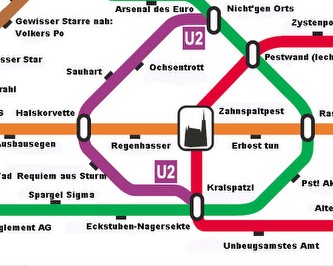 |
The Historic Charles Bridge (and other
less historic rivals) over the Vlatava River |
After visiting Prague many Americans feel compelled to title their recollections and Facebook albums with those irresistable Czech puns ("Czech-ing in from Prague" or "Czech out how drunk I got in Eastern Europe," etc.). To set my blog apart, I opted instead for some illogical alliteration that vaguely describes what I did this past weekend.
Last weekend was a national holiday here in Austria, so I did indeed cHecK out our neighbor to the north - the Czech Republic. The capital city reminded me of Disney's Fantasyland, minus the exorbitant prices and basic rules of friendly interaction, transported behind the Iron Curtain along with blue jeans, Coca-Cola and the English language in 1993.
With my American tour guide (and friend of a friend) Jesse, I visited all of the obligatory tourist attractions, including the Charles Bridge (worthwhile), the John Lennon Wall (cool idea, lame art), and Prague Castle (site of
the Second Defenestration of Prague, a tragic, yet hilarious occassion in European history). Inside the castle, which is more of a district than a specific building, I found my favorite view of the city from the top of St. Vitus Cathedral. It required a exhausting hike up an enormous spiral staircase from the 14th Century, when the average staircase climber was apparently about a foot shorter than I am. My companions and I counted the number of stairs to the top and, although none of us was accurate, I was the closest with 234 out of 237 steps counted.
 |
| The Kafka Museum was terrifying. |
We also visited the Kafka Musuem which was bizarre and unsettling, but truly "Kafkaesque" and certainly worth the 120 crowns ($5) admission fee. Upon entering the museum's courtyard I was greeted with a statue of two grown men peeing into a small pond with functional penises that are adjustable by hand or by SMS. I tried neither. At the entrance to the museum, it was nearly impossible for me to actually buy a ticket because there appeared to be no employees, or at least none that were interested in selling tickets or interacting with guests. When I eventually secured assitance, the cashier insisted that I pay in exact change and refused to break my 200 crown note, approximately equivalent to a $10 bill. When I finally entered the museum, the images and artwork varied from baffling to nightmarish and the impressive views of the Vltava River were deliberately obscured with electrical tape. All in all, I think Kafka would be proud.
As for souvenirs, I returned to Austria with a few postcards and several days worth of indigestion from greasy Czech street food. Nonetheless, my trip was affordable, educational, and exciting and I heartily recommend Prague/Praha to any European tourist.
In honor of Kafka's vision of the modern state as a terrifying bureaucratic hellhole (nowhere more accurate than Austria and Germany), my word of the day is
Amtsdeutsch or "office German." It means something along the lines of "legalese," but it refers to the indecipherable language used in German applications and forms.







